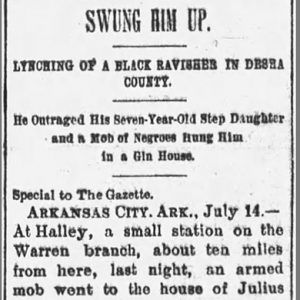calsfoundation@cals.org
Julius Mosely (Lynching of)
On July 13, 1892, Julius Mosely, an African-American man accused of raping his stepdaughter, was lynched near Halley (Desha County) by a mob of fellow black residents.
While the majority of lynchings in the South were perpetrated by white mobs against blacks, in a very small number of cases, lynchings were carried out either by mixed-race mobs or by mobs of African Americans. William Fitzhugh Brundage speculates that perhaps African Americans doubted that the all-white legal system would deal properly with crimes occurring within the black community. In addition, such lynchings often took place in cases of family-oriented crimes like incest. Interestingly, Brundage finds that such black-on-black violence was most prevalent in the Mississippi Delta regions in Mississippi, Arkansas, and northwestern Louisiana.
Very little is known about Mosely. His first name may have actually been Junius. Arkansas marriage records indicate that a twenty-four-year-old man named Junius Mosely married Mary Causby (age twenty-seven) in Arkansas City (Desha County) on August 6, 1887. According to the Arkansas Gazette, sometime during the second week of July 1892, Mosely assaulted his seven-year-old stepdaughter at Halley, located about ten miles from Arkansas City on the Warren branch line. He was charged with the crime and appeared before a black justice of the peace on July 13. He was bound over for the grand jury and put in the custody of Constable C. H. Mason, who was to deliver him to the jail in Arkansas City the following day. However, on the night of July 13, an armed mob of 100 African Americans went to the officer’s house, overpowered him, took Mosely, and “swung him up in a gin house.” At the subsequent coroner’s inquest, a jury composed of eleven African Americans and one white person ruled that “he came to his death at the hands of parties unknown.”
For additional information:
Brundage, William Fitzhugh. Under Sentence of Death: Lynching in the South. Chapel Hill: University of North Carolina Press, 1997.
“Swung Him Up.” Arkansas Gazette, July 15, 1892, p. 1.
Nancy Snell Griffith
Clinton, South Carolina
 Civil Rights and Social Change
Civil Rights and Social Change Post-Reconstruction through the Gilded Age, 1875 through 1900
Post-Reconstruction through the Gilded Age, 1875 through 1900 Mosely Lynching Article
Mosely Lynching Article 



Comments
No comments on this entry yet.